It has been a tough couple of decades for the newspaper industry. The last twenty years have ushered in a shift in expectations from readers – from a world in which it felt natural to pay today for someone to explain to you what happened yesterday, to an environment where readers expect news to be immediate, accurate and, perhaps most problematically of all, free.
The print circulation figures for the biggest newspapers in the UK make for sobering reading: across the ten most read newspapers, readership has dropped by 55% since 2000. The Daily Mirror, which sold 2.2m copies per day in 2000, now sells just over half a million copies per day; the Daily Express has fared little better, falling from 1m copies per day in 2000 to just 320,000 per day in 2019.
That drop-off in circulation understandably caused a significant chasm in the accounts of many newspapers, and it’s a gulf that digital subscriptions has not come close to closing. The financial gap has been exacerbated by the death of the paid classified ad – a formerly reliable source of income for newspapers, classifieds vanished almost overnight with the rise of free listings sites like Craigslist and Gumtree. In 2000, classified adverts (including job listings, second hand car ads, and private sales) made up 40% of newspaper industry ad revenue; by 2012, that had fallen to 18% – an estimated drop of around $15 billion. With pressure to create more and more content for less and less money, it’s little surprise that the media has had to make some compromises in pursuit of making ends meet.
One of those compromises has seen some newspapers’ online presence employing clickbait tactics to maximise the eyes on their site – as a glance at the Mail Online’s infamous (and commercially successful) ‘sidebar of shame’ will show. Alongside the mix of paparazzi shots and the breathless reporting on celebrity social media posts, the Mail runs sponsored content: pieces paid for and written by external sources, presented so as to resemble ‘real’ Mail Online stories. These pieces can reportedly bring in as much as £60k per article, so it’s little surprise that the Mail integrates them liberally into the section of their site their editor described as “the crack cocaine of journalism”.
The Mail Online model is not the only news platform to integrate original content with paid-for sponsored content, however – other papers have turned to content aggregator companies like OutBrain, Taboola and RevContent to plug paid-for content into their site, with seemingly no editorial oversight. The theory, according to the aggregators, is that by understanding who your readers are, their content aggregation plugins can serve readers content that they might like… or, at least, that they might be persuaded to click on, earning the newspaper a fractional amount of advertising revenue, which the aggregators take a cut of.
On its own that’s nothing particularly scary – the whole point of advertising has always been to convince consumers to try something they might not otherwise have considered, and the whole point of digital advertising has been to persuade users to click through to read more about whatever product or service is being promoted. Where this is carried out by the newspaper itself, it’s relatively innocuous; where ads are being served automatically and algorithmically by an aggregator platform the newspaper has almost no control over, and where different ads are served to different users, making transparency tricky… well, things get a little murkier.
Take, for example, a selection of ads that appeared on a single story in the Daily Star recently, mixed among stories from Daily Star journalists as part of Outbrain’s ‘Smartfeed’.
Some were pretty innocuous, such as this clickbaity but clearly-labelled advert for the online discount site ‘Honey’, which directed users straight to an article on Honey’s website:

Similarly, the three separate ads that appeared on this one single article all directing readers to the website of ‘Naked Wines’ were clearly labelled and not particularly misleading:

There are the kind of ads you might expect to see in the pages of a mainstream newspaper – they are explicit about what and who they are advertising, and when you click through you go to the site of that particular brand. You could readily imagine a world where the ad buyer for these companies called up the Daily Star’s commercial department to buy the ad space for their ads.
But that’s not how those ads came to be on the Star’s site: they were part of Outbrain’s plugin, and it was Outbrain who chose to accept the ads and when to show them. It’s highly unlikely that the Star even had sign-off on what ads were served to their readers – and that is a major problem, because it is the Daily Star’s brand name and reputation that these ads are trading off, not Outbrain’s.
That may not be much of a risk when it comes to wine and discount codes, but the ads served up by the Outbrain Smartfeed did not stop there. The first large ad on the page was this one, ostensibly paid for by music and culture website Popdust:

This ad took readers to an article titled “Our Editors Tried HelloFresh and Gousto: There was a Clear Winner”, where the authors described a taste testing of two meal-delivery services, to see which was best:
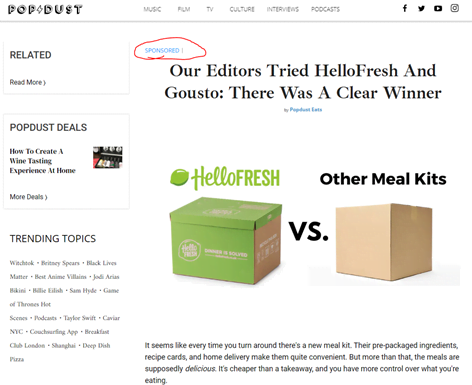
Despite being structured as a review, this article is in fact another piece of sponsored content – in this case, HelloFresh paid Popdust to run an advert which reads like an impartial review, and then HelloFresh or Popdust paid for Outbrain to place that advert into the pages of a national newspaper. Unlike the Naked Wines and Honey ads, which led readers directly to the website of the companies who paid for the advertising, this advert sold readers the illusion of independent review.
The Outbrain ads in the Star article get worse. This prominently-placed advert with the grammatically-mangled clickbait title “Arthritis or Joint Pain? Doctor Says Do This First Thing…” was too small to display the full name of the company who paid for it, but on closer inspection that company is Jupiter Labs.

Readers might be forgiven for missing that, however, as the advert doesn’t lead to the website of Jupiter Labs, it leads to a site ostensibly called “Joint Fuel” at the confusingly-titled URL lifestylemag.co. Despite appearing like an article, right down to having a profile picture of the “Editorial Staff” writer who authored it, this is article simply an advert:

Every mention of the product name, as well as the prominent advert to the right and even the website header image itself, contains an affiliate marketing link tracking users who click through to buy the product, JointFuel360 – an overpriced turmeric supplement whose medical claims are not remotely backed by evidence.
This whole site, in fact, is nothing but an example of Affiliate Marketing – a technique I’ve described previously, the worst end of which involves web developers creating bogus sites in order to persuade customers to use their referral link to buy whichever product they’re looking to push. In this case, the advert is a fake customer testimonial from ‘Iris’, a grandma in her 80s who just needs you to understand that she would be in agony and unable to walk (as, she claims, all of her friends are)… if it weren’t for the £40-per-month turmeric supplements she’s taking.
The testimonial is filled with deeply manipulative language, and is aimed squarely at a population who is less likely to be internet savvy enough to recognise that this website is not kosher – right down to its fake 5-star Google Reviews:
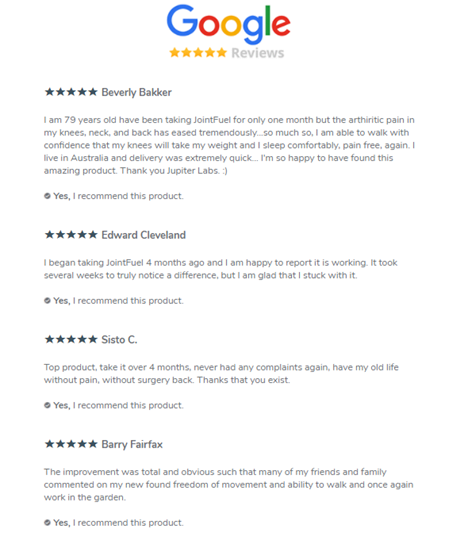
Indeed, “Lifestyle Mag” isn’t a real website, it is merely a domain name that sounds like it might be a legit website. Searching Google for all live pages on the domain, the only pages contained on the site are the JointFuel ad and two other ads from 2018: one for a product that claims to be able to unblock drains, and the other for a bag of herbs it claims can remove mould. Those, too, are filled with affiliate links and fake customer testimonials.

These practices aren’t new – the most unscrupulous elements of affiliate marketing have been around online for a long time. What is genuinely shocking, however, is to see these affiliate scams promoted from the pages of national newspapers. But because these ads aren’t booked via the newspaper directly, and because Outbrain seem either to not know enough or not care enough to screen out scams from their advertising, this single article on the Daily Star’s website was riddled with worryingly misleading ads.
There was the ad telling you to “Do This Every Time You Start Up Your PC”, which claimed to be an advert for a review site called Security Savers Online:

In reality it was an affiliate marketing site touting an antivirus software, with every page of the site being a verbatim republication of blogs from the antivirus website, presented as if they were expert reviews from an independent internet security site.
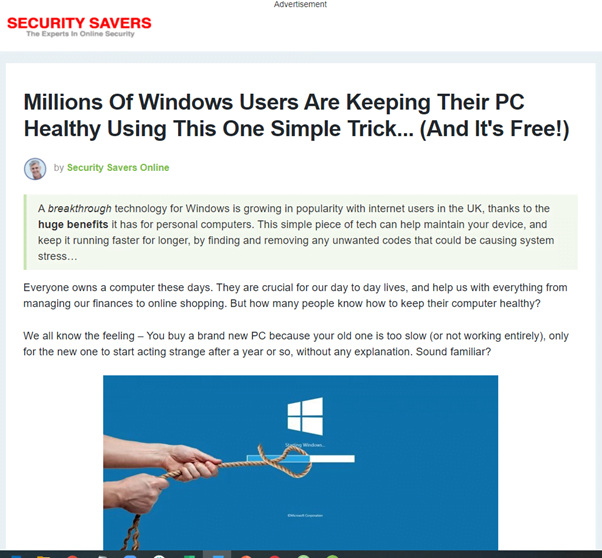
There was the ad declaring: “Self Adjusting Glasses Take United Kingdom by Storm”, leading to “Protech News”:

Protech News is another site set up to give the illusion of independence, while declaring the remarkable properties of a set of multi-lens spectacles that can be focused using a small dial built into the frame.
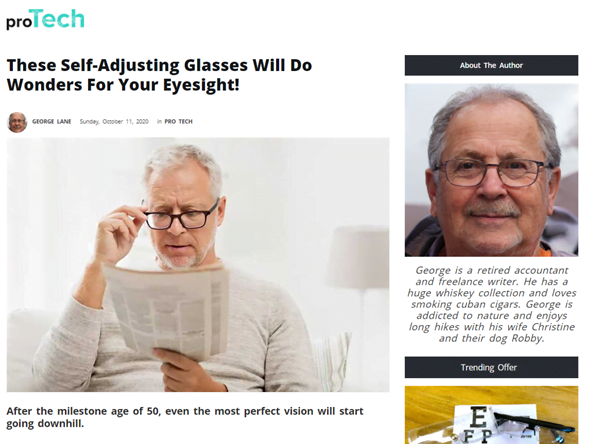
The review even goes so far as to claim it is authored by a retired accountant called George Lane, who “has a huge whisky collection” and who “enjoys long hikes with his wife Christine and their dog Robby”. Despite George being a retired accountant, he’s writing for a site called ProTech, which has only one page on it – this advert – and is registered to the UAE.
Still, a whisky-drinking, cigar-smoking retirement in the United Arab Emirates must have gotten boring for George Lane, as less than a fortnight after publishing this piece he’d deleted the ProTech website entirely and upped sticks – presumably with wife Christine and dog Robby in tow – to move to New York, setting up his new spectacles-flogging website, Vision Focus:
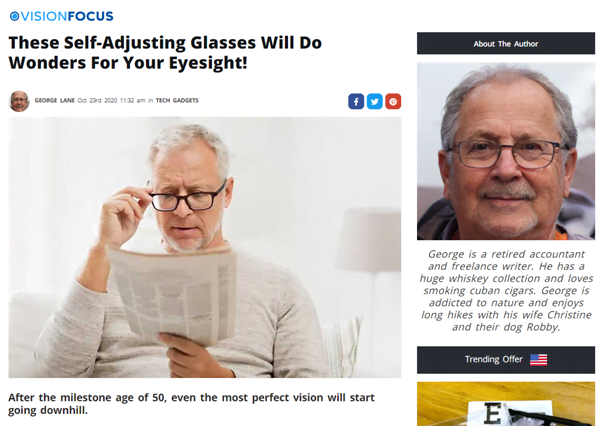
Most worrying of all of the scams displayed by Outbrain on that Daily Star article were those featuring medical claims, like this ad, which urged readers: “If You Have An Enlarged Prostate, Do This Immediately (Genius!)”.

The ad claimed once again to be directing Daily Star readers to an independent website – this time named “Your Health Today”, before delivering them to an affiliate-linked fake site making medical claims about a supplement pill which “fights the root cause of [benign prostatic hyperplasia] and may assist with enlarged prostates without any modern medicine or procedures.”
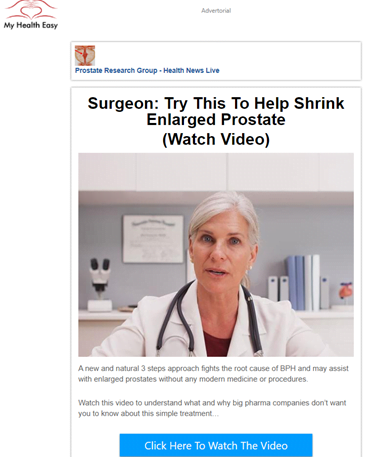
This site, actively promoted by ads on the Daily Star website, urged readers who were worried about their enlarged prostate to “understand what and why big pharma companies don’t want you to know”, before trying to sell them a product called “Prostate 911”, retailing at $69 for a month’s supply.
Every single one of the ads I’ve featured here, as well as ads for walk-in baths, pension services, will-writing services and reverse-mortgages, were served up by the Outbrain Smartfeed plugin on a single article in the Daily Star. This article wasn’t special, and it wasn’t an exception: this is the norm for sites which use content aggregators to serve sponsored content into their pages. I could have picked almost any other article from the Daily Star site, or almost any article from the Mirror Online, Daily Express, or countless local news sites across the UK.
Many of the ads I found linked to websites that strongly look to be scams, making exaggerated and deeply misleading claims in order to lure readers into using their affiliate link, gaining the affiliate marketers a kickback. Many of the ads link to sites that are mocked up to feign independence, featuring fake testimonials and reviews of dubious authorship. Some of these sites exist one day and are gone the next – certainly not the kind of sites I’d be comfortable sharing my credit card details with.
The subject matter of many of these ads is also very telling: miraculous arthritis-cure pills, pills for enlarged prostates, reading glasses, walk-in baths, dubious antivirus software – these are products that target an older generation who are less likely to be internet savvy, and are more likely to be taken advantage of by people looking to sell them products they don’t need or that don’t work.
And all of this is served up by Outbrain’s all-pervasive Smartbrain feed, plugged directly into the websites of countless respectable and authoritative newspapers who are so starved of revenue they have come to turn a blind eye to how their platform, their reputation and their readers are being exploited.
In the quest for new sources of income and new ways to make ends meet, news companies understandably must find ways to make compromises, but in my opinion, Outbrain – along with Taboola, and Revcontent, and the other content aggregators out there – are facilitating dubious and outright dodgy products that take readers for a ride, and that is a compromise too far.



